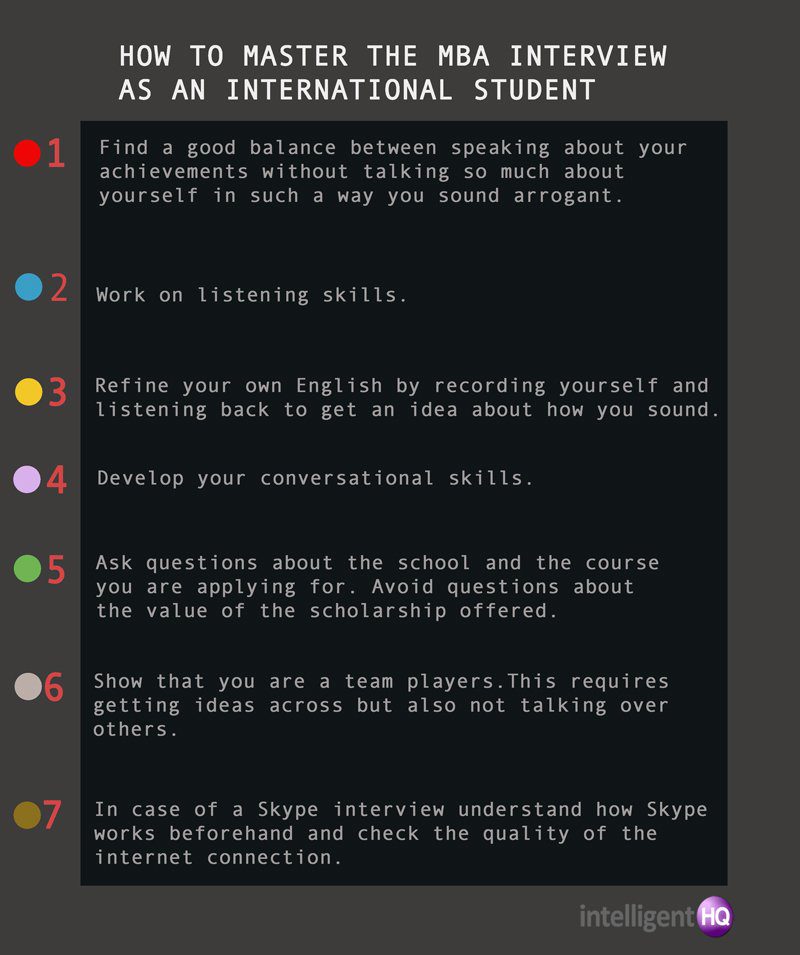
Getting a place at a top US or UK school is a dream of many prospective MBA candidates. Yet it can be difficult to know what is expected and how to handle the interview to be able to secure a much coveted place at a desirable school. Business school admissions interviews are usually harder for international students. As explained by Smith Barrow (2013) writing for US News:
“Interviews can be especially intimidating for non-native English speakers. Candidates from abroad face at least two hurdles that US students often don’t: an unfamiliar language and cultural differences.”
One of the biggest challenges is selling oneself. Cultural differences exist and in some cultures it is not considered to be polite to talk about one’s own achievements. Some cultures find this to be extremely rude. However, to get a place on an MBA programme in the United States it would be very hard to get through the interview process successfully without having emphasised personal accomplishments. It is pretty much an essential prerequisite of doing well in an interviewer. On the other hand, there is a fine balance to be had. In some cultures quite the opposite happens and some candidates talk so much about themselves that they come across as being extremely arrogant. This is equally unappealing to interviewers from the USA. When you add into this mix that the international candidate may be interviewing in a second or third language this makes the situation particularly tricky.
One important recommendation that can be made to overseas candidates for MBA places in the USA is to work on listening skills. Talking in English is obviously important to be able to get ideas across effectively, but listening is also essential. Candidates that do not listen properly to the question, or that do not pick up an important nuance could end up doing poorly in the interview. It has even been recommended that not only should candidates focus on listening to others, but they should also refine their own English by recording themselves and listening back to get an idea about how they sound.

Also on the language front one frequent criticism of how international candidates perform in interviews is with regard to their conversational skills. Some prospective students get anxious about the standard of their English. They may start focusing on this above everything else, and this can lead to a very slow running interview and poor delivery.
In terms of technology, the use of Skype is becoming increasingly common for interviewers of prospective MBA students that live overseas. It is often simply unfeasible for an interview to be held in person, and so with its free online calls, Skype is considered to be a good alternative by some interviewers. Understanding how Skype works beforehand and practicing with it may be helpful in terms of becoming comfortable with the technology. Worries about the working of Skype will be distracting in an interview setting.
Another concern for some international candidates that it is worth looking into beforehand is the quality of the internet connection. If the connection is bad and you are continually having to repeat yourself it may be very off-putting, both for you and the interviewer. This is definitely worth looking at in advance, to find the best location to get the clearest connection on Skype.
International candidates, just like other prospective students, must show that they are team players. This requires getting ideas across but also not talking over others. This is particularly important if the international candidate finds him/herself in a group admissions interview where team working skills are specifically being assessed. There is a fine balance to be achieved between not talking enough and talking too much. Demonstrating that you will be able to work well with others is a necessary part of such a process.
On the subject of talking, it is important for candidates to ask questions. A popular choice of question at this point among international students is that of financial support or scholarships. This is a poor choice of question because it assumes you have a place, and it focuses on money rather than on the school itself and its courses.It is better to ask something about the course or the teaching to show an interest in the programme.
While getting through an interview may seem like a major hurdle for an international student applying to schools in the US, it is not a deal breaker. Students should follow the tips included for the greatest chances of success.

Paula Newton is a business writer, editor and management consultant with extensive experience writing and consulting for both start-ups and long established companies. She has ten years management and leadership experience gained at BSkyB in London and Viva Travel Guides in Quito, Ecuador, giving her a depth of insight into innovation in international business. With an MBA from the University of Hull and many years of experience running her own business consultancy, Paula’s background allows her to connect with a diverse range of clients, including cutting edge technology and web-based start-ups but also multinationals in need of assistance. Paula has played a defining role in shaping organizational strategy for a wide range of different organizations, including for-profit, NGOs and charities. Paula has also served on the Board of Directors for the South American Explorers Club in Quito, Ecuador.

























